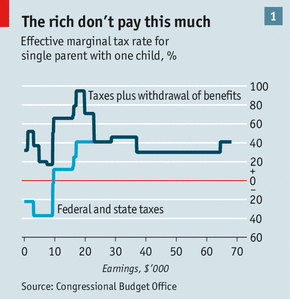A Tax on Employing Poor People
I've long been baffled by the argument that low-wage employers are "welfare queens" because their employees are on public assistance. As Jason Brennan of Bleeding Heart Libertarians wrote a few months back, if people have a human right to be paid more than their market wage, that's an obligation that falls on all of us, not just on their employers. And as Andrew Biggs has pointed out, it doesn't make sense to say that the government's decision to give money to poor people turns their employers into aid recipients.
The argument does highlight something important, however -- though I suspect it does so completely unintentionally. Poor folks who see their wages hiked don't actually get a lot of the money. The government cuts their benefits to compensate.
Here it's worth noting that the minimum wage isn't a particularly good way of targeting the poor to begin with; 68 percent of minimum-wage workers live in households that earn more than 150 percent of the poverty line. A chart from a new column by Barry Ritholtz at Bloomberg shows that fewer than half of restaurant and retail employees overall receive public assistance.
But what happens to the people who really do rely on minimum-wage incomes? As Ritholtz notes, a full-time minimum-wage employee earns $15,000 today. Hiking the wage to $10.10, as many suggest, would raise that to $21,000. Conveniently, the Congressional Budget Office has actually calculated how much money people in that income range lose as their wages increase:

The chart just covers a single parent with one child, but it seems reasonable to bet that half or more of the extra money poor employees got from a minimum-wage hike would be canceled out by taxes and reduced benefits. Employers wouldn't just be transferring more money to their workers; they'd also be paying a tax on employing poor people.
Robert VerBruggen is editor of RealClearPolicy. Twitter: @RAVerBruggen




